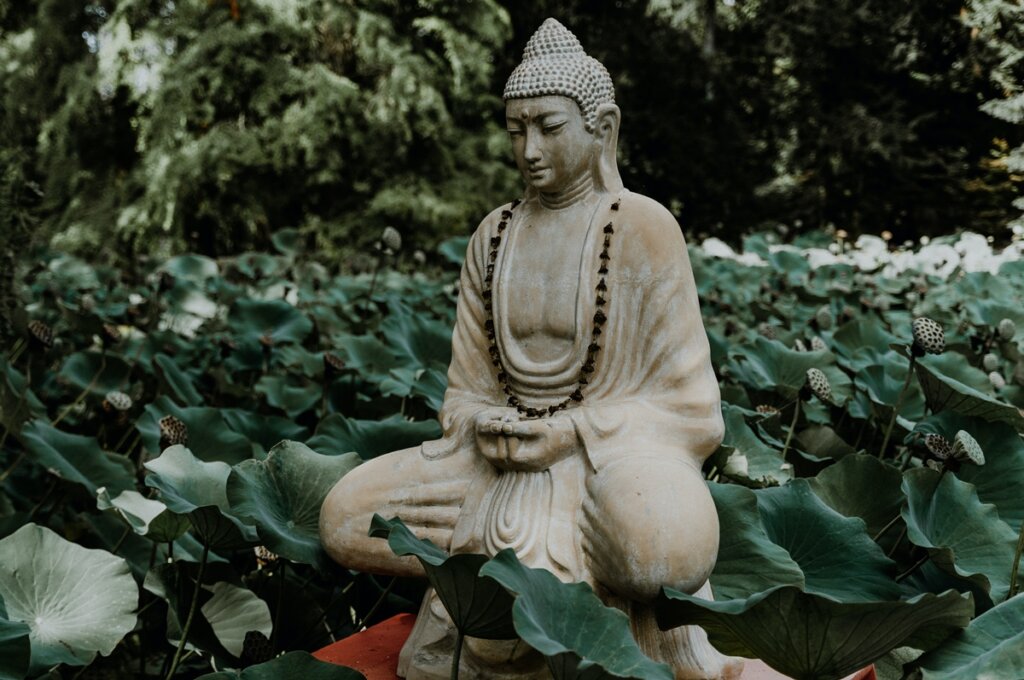Four Buddhist Strategies For Dealing With Stress


Written and verified by the psychologist Gorka Jiménez Pajares
Many people identify with or are inspired by different currents of Buddhist thought. Buddha claimed that “No matter how hard the past you can always begin again”. This is the kind of reflection that invites us to learn about the kinds of Buddhist strategies that deal with stress.
Buddhism claims that it’s events that occur in the present that determine the mental state of the individual. Therefore, the goal of Buddha’s teaching was to enable us to focus our attention more often on what’s happening in the here and now rather than on what the future holds.
“…one ought to live in the present moment, wisely and earnestly”
-Buddha-

Why Buddhism?
Initially a religion, today, Buddhism has become an extraordinary life philosophy for millions of people around the globe. In the context of Buddhist psychology, the Theravada tradition stands as the pillar of meditative practices. It’s from here that the secrets of Buddhism that deal with stress are born.
This tradition seeks to promote our awareness of ourselves, our environments, and our here and now. Its goal is for us to be able to apply more adaptive responses to the ups and downs of life.
Buddhist strategies for dealing with stress
The use of Buddhist technology in the field of psychological health isn’t new. In fact, psychologists, psychiatrists, and other medical professionals also recognize the positive effect of practices such as meditation. Indeed, the effectiveness of techniques such as mindfulness is well-recognized.
“If your compassion does not include yourself, it is incomplete.”
-Buddha-
1. Take responsibility for your present
How many times have you blamed others for mistakes that were actually yours? According to Buddhist philosophy, we alone are responsible for ourselves and the things we do. Buddhism claims that there are no redeemers. The only possible redeemer is the individual themselves. Therefore, we’re the only ones who can forgive ourselves so we can be ourselves and move forward.
Samatha meditation can help in this regard. It consists of focusing the mind on a single aspect of reality (for example, a pen). The goal is to lessen the burden of excessive overstimulation to which we’re exposed which potentially prevents us from realizing our own mistakes. To achieve this goal, we can make use of certain breathing techniques.
2. Experience the power of living in the here and now
“What a week I’ve had”, “Last year was so much better”, “I was happier when I was younger”. Taking too much refuge in the past can anchor us there and make it difficult for us to pay attention to the present. But we have no power to modify the past, so why do we focus so much on it?
More importantly, how can we improve the present? We need to focus on it. It’s a liquid substance that tends to slip through the fingers of our thoughts. But, it’s ours. We need to embrace it.
Vipassana meditation can help in this regard. It allows our minds to slide between the different stimuli as we perceive them in the here and now. It helps us feel in flux with our experiences. Moreover, it helps us become absorbed in what we’re doing and experiencing while, at the same time, giving it meaning and purpose.
3. Avoiding unhealthy attachments
This is one of the most interesting Buddhist strategies for dealing with stress. It invites us to make reflections such as:
- Why do we keep embracing relationships that hurt us?
- What makes us choose the same or similar partners?
- Why do we give so much importance to money?
- Does being obsessed with work make us feel good?
Frequently, as human beings, we become attached to things, people, and processes that bring us great discomfort. It’s because we’re unable to change or control them. To a certain extent, this is normal. There’s a Buddhist teaching called anicca which means impermanent and inconstant that can help in this regard.
Annica invites us to believe that human consciousness, or the heart of the subjective perception of the human being, involves short episodes of cognitive activity with specific and frequently rapid beginnings and ends. In fact, everything has a beginning and an end.

4. Do you always stumble over the same stone?
We can all amend, at least partially, our failures. However, sometimes we make the mistake of thinking ” That’s just the way it is”, ” You have to take me as I am” or ” I’ve always been like that, I’m not going to change now “. This is fine, as long as these actions result in our well-being.
But, when being this way hurts, Buddhism invites us to change via meditation. The goal is to reach a state called anatta or deep bewilderment. This state suggests that, although our essence remains over time in what we colloquially call personality, the “I” has the potential to change through the process of introspection.
As you can see, practicing these exercises generate multiple paths for us to follow every day. They bring us closer to ourselves. Moreover, they allow us to embrace both our mistakes and our abilities. In fact, Buddhism invites us to get to know each other better and, gradually, become happier.
“Every morning we are born again. What we do today is what matters most.”
-Buddha-
Many people identify with or are inspired by different currents of Buddhist thought. Buddha claimed that “No matter how hard the past you can always begin again”. This is the kind of reflection that invites us to learn about the kinds of Buddhist strategies that deal with stress.
Buddhism claims that it’s events that occur in the present that determine the mental state of the individual. Therefore, the goal of Buddha’s teaching was to enable us to focus our attention more often on what’s happening in the here and now rather than on what the future holds.
“…one ought to live in the present moment, wisely and earnestly”
-Buddha-

Why Buddhism?
Initially a religion, today, Buddhism has become an extraordinary life philosophy for millions of people around the globe. In the context of Buddhist psychology, the Theravada tradition stands as the pillar of meditative practices. It’s from here that the secrets of Buddhism that deal with stress are born.
This tradition seeks to promote our awareness of ourselves, our environments, and our here and now. Its goal is for us to be able to apply more adaptive responses to the ups and downs of life.
Buddhist strategies for dealing with stress
The use of Buddhist technology in the field of psychological health isn’t new. In fact, psychologists, psychiatrists, and other medical professionals also recognize the positive effect of practices such as meditation. Indeed, the effectiveness of techniques such as mindfulness is well-recognized.
“If your compassion does not include yourself, it is incomplete.”
-Buddha-
1. Take responsibility for your present
How many times have you blamed others for mistakes that were actually yours? According to Buddhist philosophy, we alone are responsible for ourselves and the things we do. Buddhism claims that there are no redeemers. The only possible redeemer is the individual themselves. Therefore, we’re the only ones who can forgive ourselves so we can be ourselves and move forward.
Samatha meditation can help in this regard. It consists of focusing the mind on a single aspect of reality (for example, a pen). The goal is to lessen the burden of excessive overstimulation to which we’re exposed which potentially prevents us from realizing our own mistakes. To achieve this goal, we can make use of certain breathing techniques.
2. Experience the power of living in the here and now
“What a week I’ve had”, “Last year was so much better”, “I was happier when I was younger”. Taking too much refuge in the past can anchor us there and make it difficult for us to pay attention to the present. But we have no power to modify the past, so why do we focus so much on it?
More importantly, how can we improve the present? We need to focus on it. It’s a liquid substance that tends to slip through the fingers of our thoughts. But, it’s ours. We need to embrace it.
Vipassana meditation can help in this regard. It allows our minds to slide between the different stimuli as we perceive them in the here and now. It helps us feel in flux with our experiences. Moreover, it helps us become absorbed in what we’re doing and experiencing while, at the same time, giving it meaning and purpose.
3. Avoiding unhealthy attachments
This is one of the most interesting Buddhist strategies for dealing with stress. It invites us to make reflections such as:
- Why do we keep embracing relationships that hurt us?
- What makes us choose the same or similar partners?
- Why do we give so much importance to money?
- Does being obsessed with work make us feel good?
Frequently, as human beings, we become attached to things, people, and processes that bring us great discomfort. It’s because we’re unable to change or control them. To a certain extent, this is normal. There’s a Buddhist teaching called anicca which means impermanent and inconstant that can help in this regard.
Annica invites us to believe that human consciousness, or the heart of the subjective perception of the human being, involves short episodes of cognitive activity with specific and frequently rapid beginnings and ends. In fact, everything has a beginning and an end.

4. Do you always stumble over the same stone?
We can all amend, at least partially, our failures. However, sometimes we make the mistake of thinking ” That’s just the way it is”, ” You have to take me as I am” or ” I’ve always been like that, I’m not going to change now “. This is fine, as long as these actions result in our well-being.
But, when being this way hurts, Buddhism invites us to change via meditation. The goal is to reach a state called anatta or deep bewilderment. This state suggests that, although our essence remains over time in what we colloquially call personality, the “I” has the potential to change through the process of introspection.
As you can see, practicing these exercises generate multiple paths for us to follow every day. They bring us closer to ourselves. Moreover, they allow us to embrace both our mistakes and our abilities. In fact, Buddhism invites us to get to know each other better and, gradually, become happier.
“Every morning we are born again. What we do today is what matters most.”
-Buddha-
All cited sources were thoroughly reviewed by our team to ensure their quality, reliability, currency, and validity. The bibliography of this article was considered reliable and of academic or scientific accuracy.
- Goleman, D. (1980). La salud mental en la psicología budista clásica. Mas alia del Ego.
- Mañas, I., Franco, C., & Faisey, M. (2009). Mindfulness y psicología: Fundamentos y términos de la psicología budista. Web de medicina y psicología, 1-18.
-
Chiesa, A. (2010). Vipassana meditation: systematic review of current evidence. The Journal of Alternative and Complementary Medicine, 16(1), 37-46.
This text is provided for informational purposes only and does not replace consultation with a professional. If in doubt, consult your specialist.







